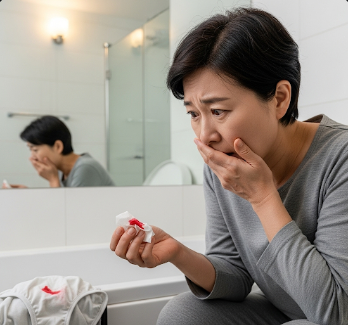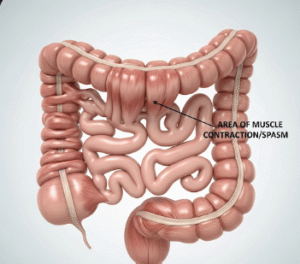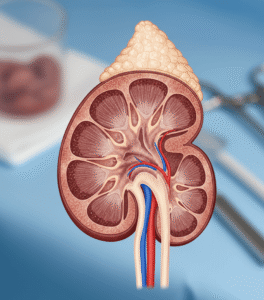Overview
Postmenopausal bleeding (PMB) is any vaginal bleeding occurring after a woman has gone through menopause, defined as 12 consecutive months without menstruation. While it is sometimes caused by benign conditions, PMB can also signal serious underlying health issues, including endometrial or cervical cancer.
It is essential that all women experiencing bleeding after menopause seek immediate medical evaluation. Early diagnosis in Korea allows access to advanced gynecological care, minimally invasive procedures, and specialized oncology services, ensuring effective management and peace of mind.
➤ Vaginal bleeding occurring after menopause
➤ Can indicate benign or serious underlying conditions
➤ Requires urgent evaluation to rule out malignancy
Key Facts
➤ Postmenopausal bleeding affects about 10% of women after menopause.
➤ While most causes are benign (e.g., atrophy or polyps), 10–15% may be due to cancer.
➤ Early medical consultation improves diagnosis, treatment outcomes, and survival in case of malignancy.
➤ Korean hospitals provide transvaginal ultrasound, hysteroscopy, endometrial biopsy, and lab diagnostics.
➤ Proper follow-up and preventive care can reduce recurrence and complications.
What is Postmenopausal Bleeding?
Postmenopausal bleeding refers to any unexpected vaginal bleeding in women who have not menstruated for over a year. It is distinct from perimenopausal spotting, which occurs during the transitional phase before menopause.
➤ Atrophic Vaginitis: Thinning of the vaginal lining causing fragile tissue and bleeding.
➤ Endometrial Polyps: Benign growths on the uterine lining leading to occasional bleeding.
➤ Endometrial or Cervical Cancer: Persistent, unexplained bleeding may indicate malignancy.
➤ Hormone Therapy Related Bleeding: Women on estrogen or combined hormone replacement therapy may experience spotting.
What Symptoms Are Related To
Postmenopausal bleeding may present alone or with associated symptoms:
➤ Unexpected vaginal bleeding or spotting.
➤ Blood-stained discharge ranging from light to heavy.
➤ Pelvic discomfort or pain in some cases.
➤ Urinary changes if the bleeding is related to bladder or urethral issues.
➤ Systemic symptoms like unexplained weight loss or fatigue, especially with malignancy.
➤ Changes in menstrual-like patterns if hormone therapy is involved.
What Causes / Possible Causes
The causes of PMB can be benign, hormonal, or malignant:
➤ Benign Causes
➤ Atrophic Vaginitis: Thinning and inflammation of vaginal tissues post-estrogen decline.
➤ Endometrial Polyps: Non-cancerous growths on the uterine lining.
➤ Uterine Fibroids: Rarely cause PMB but can contribute to irregular bleeding.
➤ Vaginal or Vulvar Lesions: Trauma, infections, or dermatological conditions.
➤ Hormonal Causes
➤ Hormone Replacement Therapy (HRT): Estrogen or combined therapy can cause bleeding.
➤ Estrogen-secreting ovarian tumors: Rare cause of abnormal postmenopausal bleeding.
➤ Malignant Causes
➤ Endometrial Cancer: Most concerning cause, especially in women over 60.
➤ Cervical Cancer: Persistent or unexplained bleeding may indicate malignancy.
➤ Vaginal Cancer: Rare, but may present as bleeding or spotting.
When Should I See My Doctor
Any occurrence of bleeding after menopause warrants prompt medical attention. Immediate consultation is necessary if:
➤ Vaginal bleeding occurs for the first time after menopause.
➤ Bleeding is persistent, heavy, or recurrent.
➤ Associated with pelvic pain, unusual discharge, or systemic symptoms.
➤ There is a history of hormone therapy, previous polyps, or gynecological cancer.
➤ Any changes in urinary or sexual function accompany the bleeding.
Early evaluation ensures timely diagnosis, prevention of progression, and appropriate treatment.
Care and Treatment
Treatment depends on the underlying cause of bleeding:
➤ Diagnostic Evaluation
➤ Transvaginal Ultrasound: Measures endometrial thickness and identifies polyps or fibroids.
➤ Endometrial Biopsy: Confirms or rules out malignancy.
➤ Hysteroscopy: Direct visualization of the uterine cavity for diagnosis and treatment.
➤ Lab Tests: Hormonal profile, infection screening, or tumor markers as needed.
➤ Benign Causes
➤ Atrophic vaginitis treated with vaginal estrogen creams or lubricants.
➤ Polyps or fibroids removed via minimally invasive hysteroscopic surgery.
➤ Infection-related bleeding treated with antibiotics or antifungals.
➤ Malignant Causes
➤ Early-stage endometrial or cervical cancer may require surgery, radiotherapy, or chemotherapy.
➤ Advanced cases may involve multidisciplinary oncology care.
➤ Follow-Up and Preventive Care
➤ Regular gynecological examinations post-menopause.
➤ Monitoring for recurrence after treatment of benign or malignant conditions.
➤ Lifestyle measures, including maintaining a healthy weight and managing hormone therapy carefully.
Treatment Options in Korea
Korea offers world-class gynecological care for postmenopausal bleeding, combining advanced diagnostics, minimally invasive treatments, and specialized oncology services:
➤ Top Hospitals for Women’s Health & Oncology
➤ Asan Medical Center (Seoul): Comprehensive gynecology, hysteroscopy, and cancer treatment.
➤ Samsung Medical Center: Minimally invasive procedures, endometrial biopsy, and oncology services.
➤ Seoul National University Hospital (SNUH): Multidisciplinary evaluation for postmenopausal bleeding and malignancy.
➤ Yonsei Severance Hospital: Advanced diagnostic imaging, hormone therapy monitoring, and surgical interventions.
➤ Modern Diagnostic Tools
➤ Transvaginal ultrasound, hysteroscopy, MRI, and biopsy.
➤ Laboratory tests for infection, hormonal status, and tumor markers.
➤ Advanced Interventions
➤ Hysteroscopic polyp or fibroid removal.
➤ Surgical oncology procedures for endometrial or cervical cancer.
➤ Hormone therapy management and minimally invasive procedures for atrophic or benign conditions.













